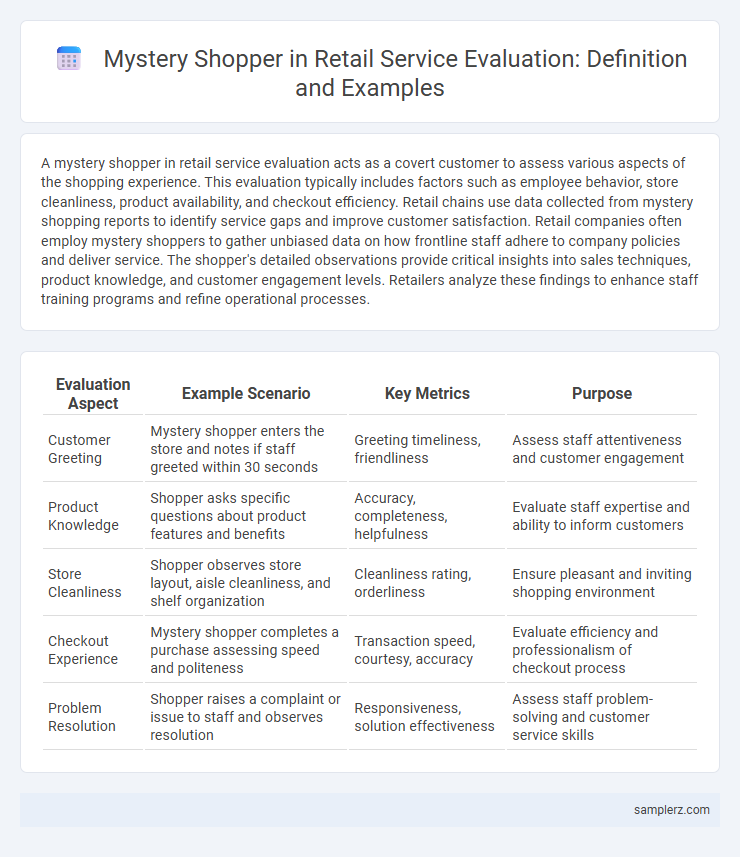A mystery shopper in retail service evaluation acts as a covert customer to assess various aspects of the shopping experience. This evaluation typically includes factors such as employee behavior, store cleanliness, product availability, and checkout efficiency. Retail chains use data collected from mystery shopping reports to identify service gaps and improve customer satisfaction. Retail companies often employ mystery shoppers to gather unbiased data on how frontline staff adhere to company policies and deliver service. The shopper's detailed observations provide critical insights into sales techniques, product knowledge, and customer engagement levels. Retailers analyze these findings to enhance staff training programs and refine operational processes.
Table of Comparison
| Evaluation Aspect | Example Scenario | Key Metrics | Purpose |
|---|---|---|---|
| Customer Greeting | Mystery shopper enters the store and notes if staff greeted within 30 seconds | Greeting timeliness, friendliness | Assess staff attentiveness and customer engagement |
| Product Knowledge | Shopper asks specific questions about product features and benefits | Accuracy, completeness, helpfulness | Evaluate staff expertise and ability to inform customers |
| Store Cleanliness | Shopper observes store layout, aisle cleanliness, and shelf organization | Cleanliness rating, orderliness | Ensure pleasant and inviting shopping environment |
| Checkout Experience | Mystery shopper completes a purchase assessing speed and politeness | Transaction speed, courtesy, accuracy | Evaluate efficiency and professionalism of checkout process |
| Problem Resolution | Shopper raises a complaint or issue to staff and observes resolution | Responsiveness, solution effectiveness | Assess staff problem-solving and customer service skills |
Introduction to Mystery Shopping in Retail Service Evaluation
Mystery shopping in retail service evaluation involves trained evaluators posing as regular customers to assess store performance, customer interactions, and overall shopping experience. These secret shoppers provide detailed reports on staff behavior, product knowledge, and store cleanliness, enabling retailers to identify strengths and areas for improvement. By leveraging mystery shopping insights, retailers enhance service quality, increase customer satisfaction, and boost sales effectiveness.
Key Roles of Mystery Shoppers in Retail
Mystery shoppers play a crucial role in retail by objectively evaluating customer service, store cleanliness, and staff behavior to ensure compliance with company standards. They provide detailed feedback on the shopping experience, including employee product knowledge and transaction efficiency, which helps retailers identify training needs and improve overall customer satisfaction. Retailers rely on mystery shoppers to deliver unbiased insights that drive strategic decisions for enhancing service quality and boosting sales performance.
Common Scenarios Used in Retail Mystery Shopping
Mystery shoppers in retail commonly evaluate scenarios such as product knowledge assessment, employee friendliness, and checkout efficiency to gauge service quality. Visits often include interactions like asking for product recommendations, returning an item, or initiating a price match request. These typical scenarios provide retailers with actionable insights into staff performance and customer experience improvements.
Example 1: Assessing Staff Product Knowledge
Mystery shoppers in retail evaluate staff product knowledge by posing as regular customers and asking detailed questions about product features, benefits, and usage. Their assessments provide valuable feedback on employees' expertise and communication skills, guiding targeted training programs to improve customer service. This method helps retailers ensure consistent, accurate information delivery, boosting customer confidence and sales.
Example 2: Evaluating Customer Service Response Time
Example 2 demonstrates a mystery shopper assessing retail customer service response time by measuring how quickly staff acknowledge and assist customers through various channels, including in-store interactions, phone calls, and online chat. The shopper records specific wait times, noting any delays or inefficiencies that affect the customer experience. Data collected helps retailers identify areas for improvement and optimize staffing and training to enhance service speed and satisfaction.
Example 3: Monitoring In-Store Cleanliness and Ambiance
Mystery shoppers assess in-store cleanliness and ambiance by evaluating factors like dust-free shelves, spotless floors, and well-maintained restrooms to ensure a welcoming environment. They also observe lighting quality, music volume, and scent to gauge the overall shopping atmosphere that influences customer satisfaction. Detailed reports help retailers identify areas for improvement and maintain high standards in store presentation.
Example 4: Testing Compliance with Company Policies
Example 4 of mystery shopper evaluations in retail involves assessing compliance with company policies by posing as regular customers to observe adherence to rules such as merchandise return procedures, employee dress codes, and promotional offer enforcement. This method provides retailers with precise data on policy adherence rates, highlighting training gaps and areas requiring operational improvements. Detailed reports from these evaluations enable targeted staff coaching, ensuring consistent customer service and policy application across all store locations.
Example 5: Mystery Shopping for Visual Merchandising Standards
Mystery shopping for visual merchandising standards involves evaluators assessing store displays, product placements, and signage to ensure alignment with brand guidelines and enhance customer experience. Specific criteria include cleanliness, organization, and the effectiveness of promotional materials in attracting attention. This method provides retailers with actionable insights to optimize store layouts and improve sales performance.
Impact of Mystery Shopper Findings on Retail Service Improvement
Mystery shopper findings provide detailed insights into customer experience and operational shortcomings, enabling retailers to target specific service gaps. Retailers often implement training programs and process adjustments based on these evaluations, leading to improved staff performance and higher customer satisfaction. Data-driven changes from mystery shopper reports contribute significantly to enhanced retail service quality and increased sales metrics.
Best Practices for Implementing Mystery Shopper Programs in Retail
Effective mystery shopper programs in retail involve selecting trained evaluators who replicate authentic customer experiences, ensuring unbiased and consistent feedback on service quality. Establishing clear evaluation criteria aligned with brand standards allows retailers to identify specific strengths and weaknesses in staff performance and store operations. Regular analysis of mystery shopper reports drives targeted employee training and operational improvements, enhancing overall customer satisfaction and loyalty.

example of mystery shopper in service evaluation Infographic
 samplerz.com
samplerz.com